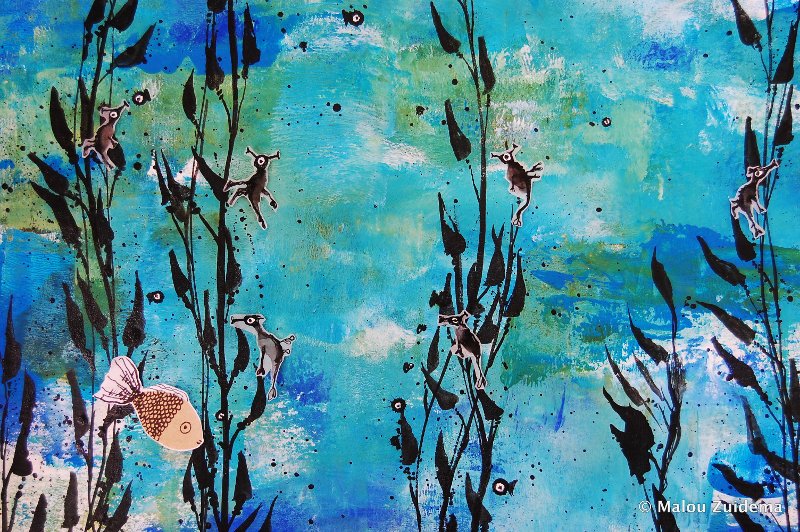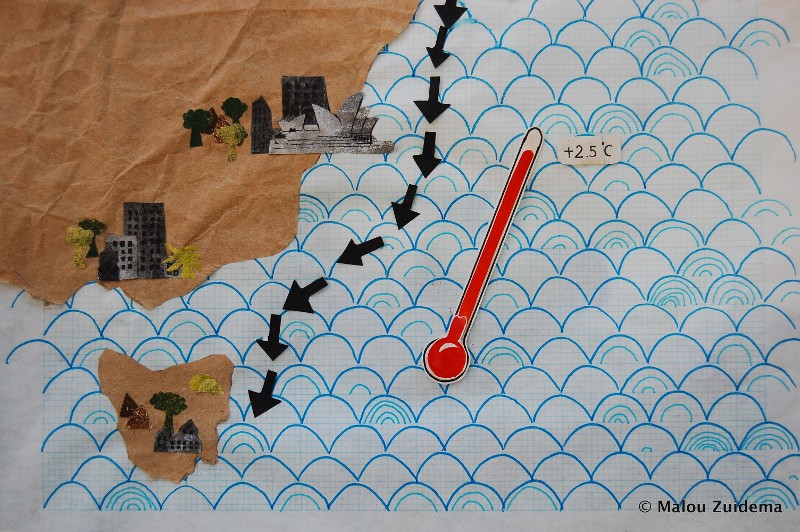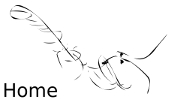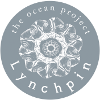Living Data
Science Art & Talks
Disclaimers, Copyrights and Citations
Conversations/Index 2010 2011 2012 2013 2014 2015 2016 2017 2018 2019 2020 2021 2022 2023 2024
The experiential process of observation and reflection is key to art and science
and is an essential component in understanding interdependence
of all species and ecosystems, terrestrial and aquatic.
Paul Fletcher Animator
Science Art & Talks
Living Data Program for the 2013 Ultimo Science Festival, Sydney, September 12-21.
Forests of the Sea, 2013 Animation by Malou Zuidema with Jorge Ramos Castillejos and Felipe Briceno Jacques
Tasmanian's East Coast waters are a global warming 'hot spot'.
An animation is made to give a sense of being present within the changing environment.
Malou Zuidema is interviewed by Dr Simon Pockleyat the Muse on Sunday 15th September 2013. She talks about her animation Forests of the Sea,made on a Lynchpin Ocean project scholarship with mentors Sue Andersonand Lisa Roberts.

Malou Zuidema. Still from the animation
Forests of the Sea
Kelp forest with Sea Dragons and fish

Malou Zuidema. Still from animation
Forests of the Sea
Temperatures rising and species moving southwards to cooler waters
As artist, my aim was to give a sense of being present within the changing environment.
The East Australian Current has moved 350 miles further south over the past fifty years with the result that Tasmanian East coast waters are warming at the rate of three to four times the global average. There has been a noted 90% decline in Giant Kelp, Macrocystis, in these eastern Tasmania waters: it is now listed as an endangered marine plant. The key driver is warming from a more energetic East Australian Current resulting from a spin-up of the south Pacific gyre, which itself stems from depleted ozone and climate change affecting wind patterns in the Southern Ocean.
These warmer waters are nutrient poor and also bring with them invasive species, including larvae of the Long-spined Sea Urchin. While Urchin grazing is a minor player in the decline of Giant Kelp, it does affect other kelps and is part of an observed marine ecosystem change.
Such changes have flow on effects. The Southern Rock Lobster has been an iconic and lucrative species supporting Tasmanian Southern Rock Lobster fisheries for generations: presently losses in the region of $1.4 million annually are being noted.
Forests of the Sea is an arts/science collaboration using stop-motion animation to give an overview of a local science story in the form of a visual narrative, illustrated with quirky characters and colourful marine scenes, as a way of drawing the community into the story of change.
I made the animation in collaboration with two Marine Science PhD Candidates from the Institute for Marine and Antarctic Studies (IMAS), University of Tasmania (UTAS), Jorge Ramos Castillejos from Mexico and Felipe Briceno Jacques from Chile. Throughout the process we asked ourselves the question "who is the science for?". Science is a highly complex and fact based profession, often hard to understand for those who do not work in the field. Using the art of stop-motion animation allowed the opportunity to explore an alternative way to communicate and make science accessible, trying to touch the emotions and imagination of the public and bring them into the story of change. We also wanted to promote cooperation between science and the fishing industry; to make real what is taking place and encourage collaborative planning for the future. Collage, print techniques and ink are used to animate a story that is part of the wider global story. As artist, my aim was to give a sense of being present within the changing environment.
The project was part of the 2012 LynchpinScholarship Program. The animation was backed by Redmap and had the mentoring support of Sue Anderson of Lynchpin and Lisa Roberts of Living Data.
Notes for exhibition designers:
This animation may be screened simultaneously in The Muse and the Data Atrium (level 3, Building 4, UTS) as part of this series:
Algae Data, by Paul Fletcher with Jennifer Clark; Time Sense, by Takuya Suzuki; Forests of the Sea by Malou Zuiedema.












